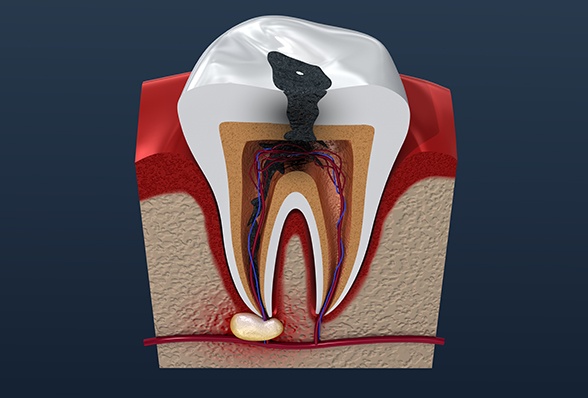Emergency Dentistry – Wilmington, VT
Urgent Care for Injured Teeth and Gums
A dental emergency is no time for doubt; you have to act quickly or else your dental pain or injury could grow worse. Put the Deerfield Valley Dental Care phone number in your phone right now so that you can call us right away. Our staff will make a same-day appointment whenever possible, and they can even see you after hours when necessary. Getting attention from a dental expert right away is key to stopping your pain and keeping your smile safe.
Why Choose Deerfield Valley Dental Care for Emergency Dentistry?
- Same-Day and After-Hour Appointments
-
State-of-the-Art Dental
Technology - Close Attention to Infection Control
How to Handle Common Dental Emergencies

There’s no single definition for a dental emergency. Some are caused by infections while others are the result of trauma. Some are extremely painful while others may not hurt as much at first but still put your oral health at risk. Let us know what your symptoms are when you first call our office. In addition to scheduling an emergency appointment, we can also give you tips for first aid and make sure that the situation doesn’t grow worse. Here’s what to do in the event of some common emergencies.
Toothaches

First, gently floss around the tooth to see if there’s anything caught in your smile. If the pain does not go away afterwards, take ibuprofen or another type of pain medication. Do not use aspirin, as it might cause a burning sensation if it touches the infected tooth or the gum tissue.
Chipped/Broken Tooth

Even a small chip or crack should be examined as soon as possible to evaluate the full extent of the damage. Save as much of the tooth as you can and place it in a safe container. Cover the rough edges of the tooth with dental wax or a wet cotton ball to stop it from irritating the inside of your mouth.
Knocked-Out Tooth

A completely knocked-out tooth can potentially be saved if you bring it to our office within an hour of the accident. Always handle the tooth by touching the crown; do not grab the roots, as this could kill the cells still living on the surface. Try to put the tooth back in its socket; if that’s not possible, store it in milk or salt water instead.
Lost Filling/Crown

Pick up the restoration and gently rinse it off. Try to put it back in place if possible. A small dab of toothpaste can act as a temporary adhesive. To avoid damaging the exposed tooth, chew with the other side of your mouth and stay away from hard or crunchy foods altogether.
How to Prevent Dental Emergencies

Some dental emergencies happen all of a sudden and can’t be avoided. However, others are the eventual result of bad habits and poor oral hygiene. You can therefore protect yourself from dental emergencies by:
- Wearing a protective mouthguard when playing football and other sports.
- Not biting down on ice, fingernails, or other hard objects that could chip or crack the enamel.
- Using scissors to open packages or remove tags instead of your teeth.
- Brushing and flossing twice a day.
- Visiting our office for biannual checkups.
The Cost of Treating Dental Emergencies

Different types of emergencies require different kinds of treatments. We’ll only be able to give you an estimate of the final cost once we know how severe the damage is and what kind of treatment is needed. Note that having a dental emergency treated as soon as possible is usually the less expensive option. Ignoring a cavity, for example, will allow the damage to spread, so an issue that once could have been solved by a filling could eventually result in an extraction.
Root Canals

Endodontic (root canal) treatment is indicated when the pulp, or nerve, of a tooth has died. This dead tissue inside the tooth will form an abscess resulting in pain and swelling. The goal of a root canal procedure is to remove the dead tissue, thoroughly clean out the internal chamber and canal and then place a sterile, inert filling. It’s not painful under most circumstances. We have up-to-date equipment to provide a comfortable procedure and a predictable result.
Tooth Extractions

We want you to be able to keep your natural teeth for the rest of your life. Whenever a tooth has been damaged or infected, the first option will always be to try to salvage it. Extractions are reserved for situations where the tooth is so badly decayed or has been broken so extensively that it cannot be repaired. At that point, removing it is the best choice for your oral health.
